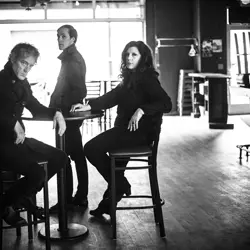 Low
Low"Playing slow is a lot harder than it looks, but you can get used to it," offers Alan Sparhawk, guitarist and vocalist for beloved Minnesota minimalists Low, a band who've carved out an effectual six-album/nine-year career by playing prettily, quiet, and deathly slow. "It's a dangerous thing for us, because if you get used to pushing yourself to feel more comfortable playing slow, things just get slower and slower and slower. Your mind can start to play tricks on you, and pretty soon you're playing a 5-minute song for 12-minutes."
Of course, Low - who hail from the tiny mill town of Duluth, Minnesota - have never been just a band who plays slow; marrying this icy isolationism with a kind of hearty hearth, a home fire kept burning while the cadence of their music keeps a positively hibernating pulse. Making such music, Low have become a touchstone, a reference point, for slow-and-pretty music being made everywhere. Their influences may be disparate - they've covered songs by Jandek, John Denver, and Joy Division - but their influence has been constant.
"It's always lingering in the back of your mind: what is the scope of what we do? How important is it? When is it appropriate for it to end? Will there ever been an end, or will it always mutate?" Sparhawk asks, rhetorically, of himself, pondering both the past and the current state of play in Low; a rock band that's become more like a family following the birth of Sparhawk and drummer/vocalist Mimi Parker's first child, Hollis Mae, nearly two years ago.
"We've never planned too far ahead, we just do a record, and then go out and play, and hopefully we don't kill ourselves, and if we get done playing and we have a few new songs we'd like to record, we make a record again," he laughs.
Don't miss a beat with our FREE daily newsletter
"When we started, we didn't really picture anything happening. Then someone offered us a deal, a contract to put out our first record. But, then, you get lawyers involved, and they say to you: 'well, you should really get them to confirm to put out two records.' And, we're like: 'gee, two records, that changes things.'"
For Low, "every step has been one step at a time." That first record, I Could Live In Hope (1994) became two more for pseudo-major Caroline records: Long Division (1995) and The Curtain Hits The Cast (1996). The three albums are all very similar in intent and delivery; all shimmering delay-draped guitars and snails pace rhythms; and there's still many that'll argue that Curtain is the highpoint for Low's career.
In the years since, the trio have experimented, from the straight-up experimentalism of Songs For A Dead Pilot (1997) to their newfound confidence in classic-pop styles on their last two long players, Secret Name (1999) and Things We Lost In The Fire (2001), which at moments echo acts like the Beatles in their use of tone and their focus on harmony. Coupled with this, Sparhawk and Parker have become more confident as songwriters, letting their guards down to pen tunes about specific things from their life - religion, parenthood - without reservation.
"I'm finding that for the last year or so I've been writing songs that are the most brave, confessional songs," Sparhawk says. "Over the years, I've been lyrically quite guarded, cryptic in what I'm trying to say, and I think as you become an older person you become a little more desperate. I think it's a combination of not being afraid of anything anymore and being desperate. You just start flat-out saying what's on your mind."
"People ask what are some of the things that change when you become a parent," he continues. "And, I think, for me, surprisingly, I'm not afraid of things anymore. I'm not uncertain about things anymore. There's a perspective you gain that prompts you to be a little more forward, like: well, I guess I better say what I need to say, and do what I need to do. Why waste time? Why screw around? If this is important enough I should do this now. I should say what I want to say. If nobody understands, or nobody wants to hear it, who cares?"
















